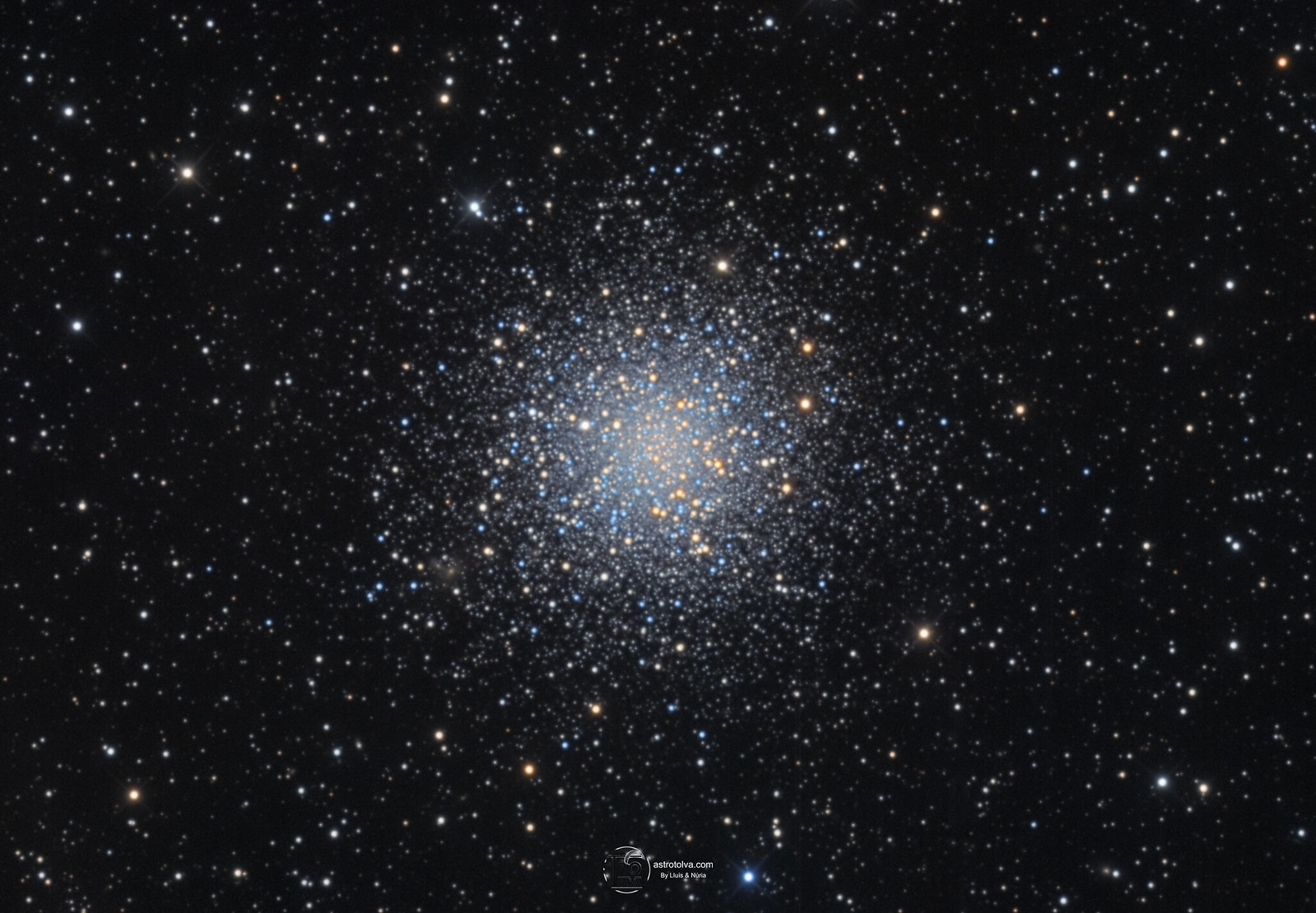Submissions: 2022 June
Submissions: 2022 June
__________________________________________________________________________________________________
Please post your images here.
Please see this thread before posting images; posting images demonstrates your agreement with
the possible uses for your image.
If hotlinking to an image, please ensure it is under 500K.
Hotlinks to images over 500K slow down the thread too much and will be disabled.
Thank you!
_________________________________________________________________________________________________
<- Previous submissions
Please post your images here.
Please see this thread before posting images; posting images demonstrates your agreement with
the possible uses for your image.
If hotlinking to an image, please ensure it is under 500K.
Hotlinks to images over 500K slow down the thread too much and will be disabled.
Thank you!
_________________________________________________________________________________________________
<- Previous submissions
Know the quiet place within your heart and touch the rainbow of possibility; be
alive to the gentle breeze of communication, and please stop being such a jerk. — Garrison Keillor
alive to the gentle breeze of communication, and please stop being such a jerk. — Garrison Keillor
Re: Submissions: 2022 June
Lagoon Nebula close up
Telescope: SharpStar 150 f2,8
Guide Scope:Evoguide
Mount : Skywatcher HEQ5
Imaging camera: ZWO 2600MC
Guiding camera: ZWO 290 MC
Filters: Idas NBZ
Plate solving: SGpro
Imaging software: Sgpro
Guiding software: PHD2
Processing software: Pixinsight
Lpro 90X120s exposure@100Gain
Integration: 3 hrs
Copyright@Davide Mancini
Telescope: SharpStar 150 f2,8
Guide Scope:Evoguide
Mount : Skywatcher HEQ5
Imaging camera: ZWO 2600MC
Guiding camera: ZWO 290 MC
Filters: Idas NBZ
Plate solving: SGpro
Imaging software: Sgpro
Guiding software: PHD2
Processing software: Pixinsight
Lpro 90X120s exposure@100Gain
Integration: 3 hrs
Copyright@Davide Mancini
-
Mohamedusama19
- Ensign
- Posts: 10
- Joined: Fri Aug 20, 2021 11:51 am
Re: Submissions: 2022 June
Narrowband Butterfly nebula dancing in Cygnus area
Here you can see the beautiful Butterfly Nebula and crescent Nebula in their colourful outfit
Copyright: Mohamed Usama Ismail / Ursamo Astrophotography
Equipment:
Imaging Lens ,Canon 135mm f2.0 L
Imaging Camera ,Canon 80D (Stock)
Mount ,Sky-Watcher Star Adventurer
Date: June 21, 2020 · April 10, 2021
Frames: 25x120" Oiii/95x180" Ha
Location: Egypt
Astrobin: https://www.astrobin.com/na8dkn/
-----------------------------------------------------------------
Facebook: https://www.facebook.com/UrsamoAstro/
Instagram: https://www.instagram.com/ursamo_astrophotography/
https://cdn.astrobin.com/thumbs/xcqwcJ7 ... TMg_pd.jpg
Here you can see the beautiful Butterfly Nebula and crescent Nebula in their colourful outfit
Copyright: Mohamed Usama Ismail / Ursamo Astrophotography
Equipment:
Imaging Lens ,Canon 135mm f2.0 L
Imaging Camera ,Canon 80D (Stock)
Mount ,Sky-Watcher Star Adventurer
Date: June 21, 2020 · April 10, 2021
Frames: 25x120" Oiii/95x180" Ha
Location: Egypt
Astrobin: https://www.astrobin.com/na8dkn/
-----------------------------------------------------------------
Facebook: https://www.facebook.com/UrsamoAstro/
Instagram: https://www.instagram.com/ursamo_astrophotography/
https://cdn.astrobin.com/thumbs/xcqwcJ7 ... TMg_pd.jpg
Last edited by bystander on Thu Jun 02, 2022 5:07 am, edited 2 times in total.
Reason: Please no hotlinks to images > 500kb. Substituted a smaller image.
Reason: Please no hotlinks to images > 500kb. Substituted a smaller image.
Re: Submissions: 2022 June
Globular Star Cluster M5
Click on above to enlarge
Full info @ https://www.kinchastro.com/m5-star-cluster.html
Click on above to enlarge
Full info @ https://www.kinchastro.com/m5-star-cluster.html
-
TaraMostofi
- Ensign
- Posts: 12
- Joined: Mon May 11, 2020 6:29 am
Re: Submissions: 2022 June
tau-Herculid Meteor in Cygnus with the North American Nebula and the Sadr Region
It wasn't the meteor storm of a lifetime but was still a decent show.
In the early morning of the 31st, after hiking around Pinnacles National Park shooting meteors over Bear Gulch Reservoir, and then shooting a Milky Way Panorama, I returned to the campground and only had an hour or so of dark skies left. I set up my Canon Eos Ra (factory modified) on the Skywatcher Star Adventurer and pointed towards the constellation Cygnus in the Milky Way (with the North American Nebula at the bottom of the frame and the Sadr region at the top of the frame) and took 1-minute exposures. This is a single exposure captured at 3:14 am (well after the predicted peak of 10 PM PDT, 5 am UTC 31 May). I'll probably stack all the frames later, but there is something romantic about a single exposure with a meteor for me. 85mm Rokinon Special Edition, f/2.8, ISO1600, 60", I have set up my 85mm lens on a tracker several times during meteor showers and have only caught a few tiny meteors in the past, so it was gratifying to capture one while focused on such a small patch of sky.
Thank you so much for your consideration
Tara Mostofi
It wasn't the meteor storm of a lifetime but was still a decent show.
In the early morning of the 31st, after hiking around Pinnacles National Park shooting meteors over Bear Gulch Reservoir, and then shooting a Milky Way Panorama, I returned to the campground and only had an hour or so of dark skies left. I set up my Canon Eos Ra (factory modified) on the Skywatcher Star Adventurer and pointed towards the constellation Cygnus in the Milky Way (with the North American Nebula at the bottom of the frame and the Sadr region at the top of the frame) and took 1-minute exposures. This is a single exposure captured at 3:14 am (well after the predicted peak of 10 PM PDT, 5 am UTC 31 May). I'll probably stack all the frames later, but there is something romantic about a single exposure with a meteor for me. 85mm Rokinon Special Edition, f/2.8, ISO1600, 60", I have set up my 85mm lens on a tracker several times during meteor showers and have only caught a few tiny meteors in the past, so it was gratifying to capture one while focused on such a small patch of sky.
Thank you so much for your consideration
Tara Mostofi
Re: Submissions: 2022 June
Hi guys,approaching Rosette Nebula core,buckle up 
Telescope: SharpStar 150 f2,8
Guide Scope:Evoguide
Mount : Skywatcher HEQ5
Imaging camera: ZWO 2600MC
Guiding camera: ZWO 290 MC
Filters: NBZ Idas
Plate solving: SGpro
Imaging software: Sgpro
Guiding software: PHD2
Processing software: Pixinsight
NBZ: 120X120s exposure@100 Gain
Integration: 4 hrs
Copyright@DavideMancni
Telescope: SharpStar 150 f2,8
Guide Scope:Evoguide
Mount : Skywatcher HEQ5
Imaging camera: ZWO 2600MC
Guiding camera: ZWO 290 MC
Filters: NBZ Idas
Plate solving: SGpro
Imaging software: Sgpro
Guiding software: PHD2
Processing software: Pixinsight
NBZ: 120X120s exposure@100 Gain
Integration: 4 hrs
Copyright@DavideMancni
Re: Submissions: 2022 June
Horsehead Nebula
Telescope: SharpStar 150 f2,8 Guide Scope:Evoguide Mount : Skywatcher HEQ5 Imaging camera: ZWO 2600MC Guiding camera: ZWO 290 MC Filters: NBZ Idas Plate solving: SGpro Imaging software: Sgpro Guiding software: PHD2 Processing software: Pixinsight NBZ: 120X120s exposure @100Gain Integration: 4 hrs
Copyright@Davide Mancini
Telescope: SharpStar 150 f2,8 Guide Scope:Evoguide Mount : Skywatcher HEQ5 Imaging camera: ZWO 2600MC Guiding camera: ZWO 290 MC Filters: NBZ Idas Plate solving: SGpro Imaging software: Sgpro Guiding software: PHD2 Processing software: Pixinsight NBZ: 120X120s exposure @100Gain Integration: 4 hrs
Copyright@Davide Mancini
Re: Submissions: 2022 June
Sh2-101
Sh2-101, at least in the field seen from Earth, is in close proximity to microquasar Cygnus X-1, site of one of the first suspected black holes. Cygnus X-1. The companion star of Cygnus X-1 is a spectral class O9.7 Iab supergiant with a mass of 21 solar masses and 20 times the radius of the Sun. The period of the binary system is 5.8 days and the pair is separated by 0.2 astronomical units. The black hole has a mass of 15 solar masses and a Schwarzschild radius of 45 km. A bowshock is created by a jet of energetic particles from the black hole as they interact with the interstellar medium can be seen as an arc (bluish) to the right of the "Tulip".
Click on above to enlarge.
Full info @ https://www.kinchastro.com/sh2-101-2022.html
Sh2-101, at least in the field seen from Earth, is in close proximity to microquasar Cygnus X-1, site of one of the first suspected black holes. Cygnus X-1. The companion star of Cygnus X-1 is a spectral class O9.7 Iab supergiant with a mass of 21 solar masses and 20 times the radius of the Sun. The period of the binary system is 5.8 days and the pair is separated by 0.2 astronomical units. The black hole has a mass of 15 solar masses and a Schwarzschild radius of 45 km. A bowshock is created by a jet of energetic particles from the black hole as they interact with the interstellar medium can be seen as an arc (bluish) to the right of the "Tulip".
Click on above to enlarge.
Full info @ https://www.kinchastro.com/sh2-101-2022.html
Last edited by Kinch on Fri Jun 03, 2022 3:09 pm, edited 1 time in total.
-
astrosirius
- Science Officer
- Posts: 111
- Joined: Fri Nov 23, 2012 11:17 am
- Location: Barcelona Spain
- Contact:
Re: Submissions: 2022 June
Lluís Romero Ventura
http://astrotolva.com/
http://astrotolva.com/
-
Paulee97
- Ensign
- Posts: 41
- Joined: Thu Sep 22, 2016 4:18 pm
- AKA: Paulee
- Location: Brno, Czech Republic
- Contact:
Re: Submissions: 2022 June
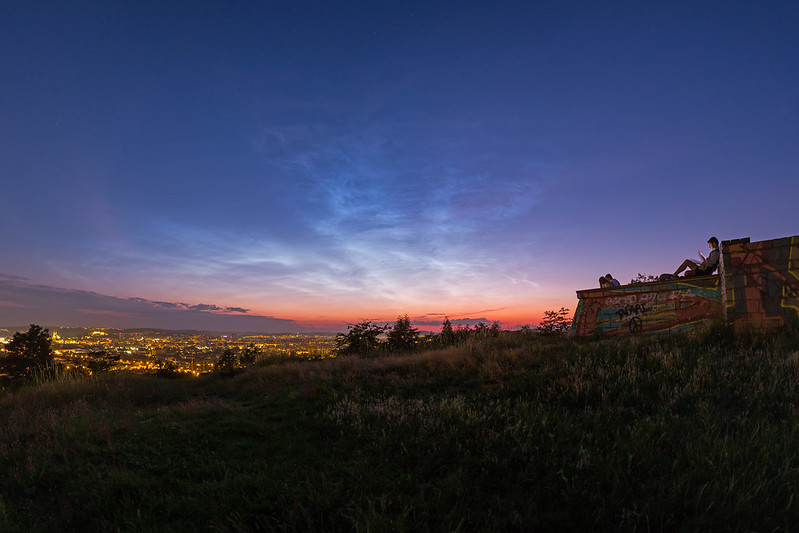
Noctilucent clouds over Brno
Copyright: Pavel Váňa
Noctilucent clouds over Brno seen on the 4th of July 2021. Small crystals of water make this beautiful show every year.
Canon EOS 6D, Sigma Art 24mm, f/4, ISO 320, exposure time 3.2 s. Panorama made of 14 single shots.
-
Paulee97
- Ensign
- Posts: 41
- Joined: Thu Sep 22, 2016 4:18 pm
- AKA: Paulee
- Location: Brno, Czech Republic
- Contact:
Re: Submissions: 2022 June
 NLC show over Brno
NLC show over Brno Copyright: Pavel Váňa
Another view of noctilucent clouds as seen in July 2021 from Brno, Czech Republic. Ice crystals with their beautiful blue shine make this show every year.
Panorama was made of 13 single images with exposure time 2 seconds. Canon EOS
6D, ISO 500, Canon EF 50 mm, f/3.2.
-
Carballada
- Ensign
- Posts: 22
- Joined: Sat Mar 16, 2019 10:19 am
Re: Submissions: 2022 June
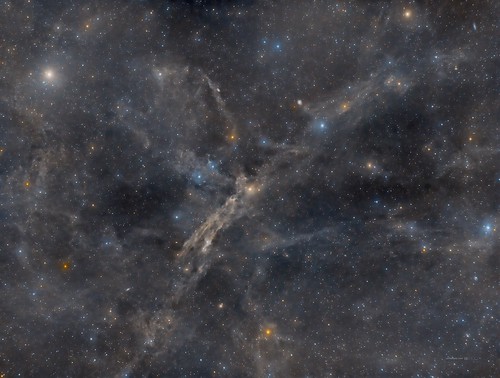
Angel Nebula (MW2) wide field by Jose Carballada, on Flickr
Mandel Wilson 2, Dust Angel or Angel nebula, is made up of Integrated Flux Nebula (IFN).
According to Steve Mandel-Wilson, IFN are "high galactic latitude nebulae ... illuminated not by a single star (as most nebulae in the plane of the Galaxy are) but by the energy from the integrated flux of all the stars in the Milky Way".
Meaning... the combined light of stars along the Milky Way are reflected by these cosmic dust clouds that soar some 300 light-years or so above the plane of our galaxy.
It's amazing what myriad of small galaxies are in the background of htis picture....
It's a extremelly faint nebula on a large wide field, on the same frame it's possible to alocate 50 full moons.....
Re: Submissions: 2022 June
WR 134 (A crop from a previous image)
Click on above to enlarge.
Full info @ https://www.kinchastro.com/wr-134-in-cygnus.html
Click on above to enlarge.
Full info @ https://www.kinchastro.com/wr-134-in-cygnus.html
-
KuriousGeorge
- Science Officer
- Posts: 218
- Joined: Wed Dec 30, 2015 7:07 am
- Location: San Diego, CA
- Contact:
Re: Submissions: 2022 June
Cat's Eye Nebula core using Lucky Imaging. KG Observatory, Julian, CA.
https://www.astrobin.com/7oxzoj/D/
https://www.astrobin.com/7oxzoj/D/
Re: Submissions: 2022 June
I was playing around with HOO version of my WR134 image. Although I dislike putting forward "starless" images.....I thought this was quite interesting......and wanted to share. Takahashi FSQ130ED with ZWO ASI2600MM
Click on above to enlarge.
See also: https://www.kinchastro.com/wr-134-in-cygnus.html
Click on above to enlarge.
See also: https://www.kinchastro.com/wr-134-in-cygnus.html
-
Davey_415
Re: Submissions: 2022 June
Image of the Rosette Nebula taken back in December 2021 with my Williams Optics Z73. Used the ASIAir pro to acquire 24 x 300s images @ -5c & 111 gain for Ha, Sii, & Oiii.
Location - Somerset / England
Date - December 23rd 2021
Acquisition - 8x300s on HA + S2 + O3 filters.
Integration: 2 hrs
Full image details - https://www.astrobin.com/ip1h6l/
Location - Somerset / England
Date - December 23rd 2021
Acquisition - 8x300s on HA + S2 + O3 filters.
Integration: 2 hrs
Full image details - https://www.astrobin.com/ip1h6l/
-
Jean-Baptiste Auroux
- Ensign
- Posts: 76
- Joined: Tue Nov 14, 2017 10:06 pm
Re: Submissions: 2022 June
LDN 673 & LDN 684 - Dark tendrils in Aquila
https://cdn.astrobin.com/solutions/imag ... 419342.png
Full version : https://cdn.astrobin.com/thumbs/2puvJYv ... 2EQU70.jpg
The dark nebulae LDN 673 (left) and LDN 684, located at 600 light-years in the constellation of Aquila. Other small dark structures also referenced in the LDN catalog complete this picture (LDN 676, 677, 683, 686, 692).
This area is located in the plane of the Milky Way, which is visible mostly in the background of the "Great Rift", a huge opaque band consisting mainly of dust and dihydrogen, which extends from the constellation Cygnus to the center of the galaxy in the constellation Sagittarius.
In fact, the stars visible behind this band of dust all seem "reddened", hence the general hue of the image.
The dark nebulosities LDN are still in the foreground and, much denser and more opaque than the dust of the great rift, they totally block the light of the stars in the background.
TSA102 f/6 - AZEQ6 - Atik16200
Filtres Baader LRGB
L : 19 x 600s bin1
RGB : 36 x 300s bin1
Total : 6h10
Processing: Pixinsight & Photoshop.
14/08/2020 (Corsica - France)
Copyright: Jean-Baptiste Auroux
https://millenniumphoton.com/
https://www.astrobin.com/users/Jean-Baptiste_Paris/
https://cdn.astrobin.com/solutions/imag ... 419342.png
Full version : https://cdn.astrobin.com/thumbs/2puvJYv ... 2EQU70.jpg
The dark nebulae LDN 673 (left) and LDN 684, located at 600 light-years in the constellation of Aquila. Other small dark structures also referenced in the LDN catalog complete this picture (LDN 676, 677, 683, 686, 692).
This area is located in the plane of the Milky Way, which is visible mostly in the background of the "Great Rift", a huge opaque band consisting mainly of dust and dihydrogen, which extends from the constellation Cygnus to the center of the galaxy in the constellation Sagittarius.
In fact, the stars visible behind this band of dust all seem "reddened", hence the general hue of the image.
The dark nebulosities LDN are still in the foreground and, much denser and more opaque than the dust of the great rift, they totally block the light of the stars in the background.
TSA102 f/6 - AZEQ6 - Atik16200
Filtres Baader LRGB
L : 19 x 600s bin1
RGB : 36 x 300s bin1
Total : 6h10
Processing: Pixinsight & Photoshop.
14/08/2020 (Corsica - France)
Copyright: Jean-Baptiste Auroux
https://millenniumphoton.com/
https://www.astrobin.com/users/Jean-Baptiste_Paris/
Last edited by bystander on Sun Jun 05, 2022 1:02 pm, edited 1 time in total.
Reason: Please, no hot link to images > 500 kb. Substituted a smaller image.
Reason: Please, no hot link to images > 500 kb. Substituted a smaller image.
Re: Submissions: 2022 June
I thought it was about time I imaged the other Northern region of the Milky Way that contains Cygnus, The Swan or Northern Cross of the night sky. Also was nice to use my old D810!
 Swan of the Milky Way by Ahmed Waddah, on Flickr
Swan of the Milky Way by Ahmed Waddah, on Flickr
29/5/2022
D810
SWSA - Unguided
Sigma 40mm f/1.4 @f/2.2 - ISO 800 - 60" x137
Optolong L-Pro
Black Desert, Egypt
Bortle 2
https://www.astrobin.com/f7r3cb/
Copyright: Ahmed Waddah/ Waddah Photography
Facebook: https://www.facebook.com/waddah.photography
Astrobin: https://www.astrobin.com/users/WolfHeart/
IG: https://www.instagram.com/waddahphotography/
 Swan of the Milky Way by Ahmed Waddah, on Flickr
Swan of the Milky Way by Ahmed Waddah, on Flickr29/5/2022
D810
SWSA - Unguided
Sigma 40mm f/1.4 @f/2.2 - ISO 800 - 60" x137
Optolong L-Pro
Black Desert, Egypt
Bortle 2
https://www.astrobin.com/f7r3cb/
Copyright: Ahmed Waddah/ Waddah Photography
Facebook: https://www.facebook.com/waddah.photography
Astrobin: https://www.astrobin.com/users/WolfHeart/
IG: https://www.instagram.com/waddahphotography/
Re: Submissions: 2022 June
Ngc 2655, the Conch Shell Galaxy.
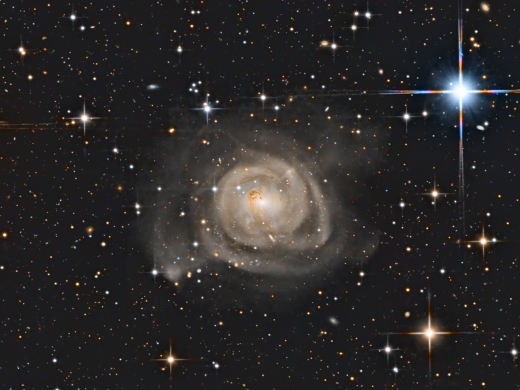
High-resolution image and technical data: http://www.javierlaina.es/IMAGENES/ngc2655.html
Javier Gómez Laina (Spain)
http://www.javierlaina.es/indexeng.html

High-resolution image and technical data: http://www.javierlaina.es/IMAGENES/ngc2655.html
Javier Gómez Laina (Spain)
http://www.javierlaina.es/indexeng.html
-
KuriousGeorge
- Science Officer
- Posts: 218
- Joined: Wed Dec 30, 2015 7:07 am
- Location: San Diego, CA
- Contact:
-
ExplorerEGYWO
- Ensign
- Posts: 25
- Joined: Mon Jul 19, 2021 6:40 pm
Re: Submissions: 2022 June

https://live.staticflickr.com/65535/521 ... a955_o.jpg
Bode Galaxy - Cigar Galaxy - NGC 2976 & IFN group by Wael Omar, on Flickr
M81, also known as Bode's galaxy, is a large bright spiral galaxy located 11.8 million light-years away in the constellation of Ursa Major. It’s a grand design galaxy of diameter 90000 light years with active nucleus that has supermassive Black hole ( 70 million solar mass). It’s also reported that M81 may be the source of FRB 20200120E, a repeating fast radio burst. You can find it in the middle right of my image.
Next to its lower left is the M82 , also known “Cigar Galaxy”, it’s a star burst galaxy that undergo high rate of star formation which is triggered by interaction with the neighboring Bode’s galaxy. Tidal forces caused by gravity have deformed M82, a process that started about 100 million years ago. This interaction has caused star formation to increase tenfold compared to "normal" galaxies. The red spark in the middle of M81 represent the light from the glowing hydrogen filaments.
On the upper right you can see very small spot , its NGC 2976 , a peculiar dwarf galaxy .the galaxy's outer regions stopped making stars because the gas ran out. Now, the inner disk is almost out of gas as new stars burst to life, shrinking the star-formation region to a small area of about 5,000 light-years around the core. The very small blue dots in the galaxy are fledgling blue giant stars residing in the remaining active star-birth regions.
All over the image there is reddish brown interstellar dust known as IFN “Integrated flux nebula “. These nebula clouds are illuminated by energy from the integrated flux of all the stars , They are composed of dust particles, hydrogen and carbon monoxide and other elements.
Gears and Acquisition Data:
The image is represented in HaLRGB , Total Exposure = 7 hrs and 10 minutes taken at Bortle 5 and Bortle 2 areas.
I use zwo 294 mm pro with Red Cat 51, the FOV is too wide for these galaxies but I tried my best to reveal their details as I could.
I created different crops to have different views of the objects included in my imaging session.

https://live.staticflickr.com/65535/521 ... a8c3_o.jpg
Bode's Galaxy - Cigar Galaxy by Wael Omar, on Flickr
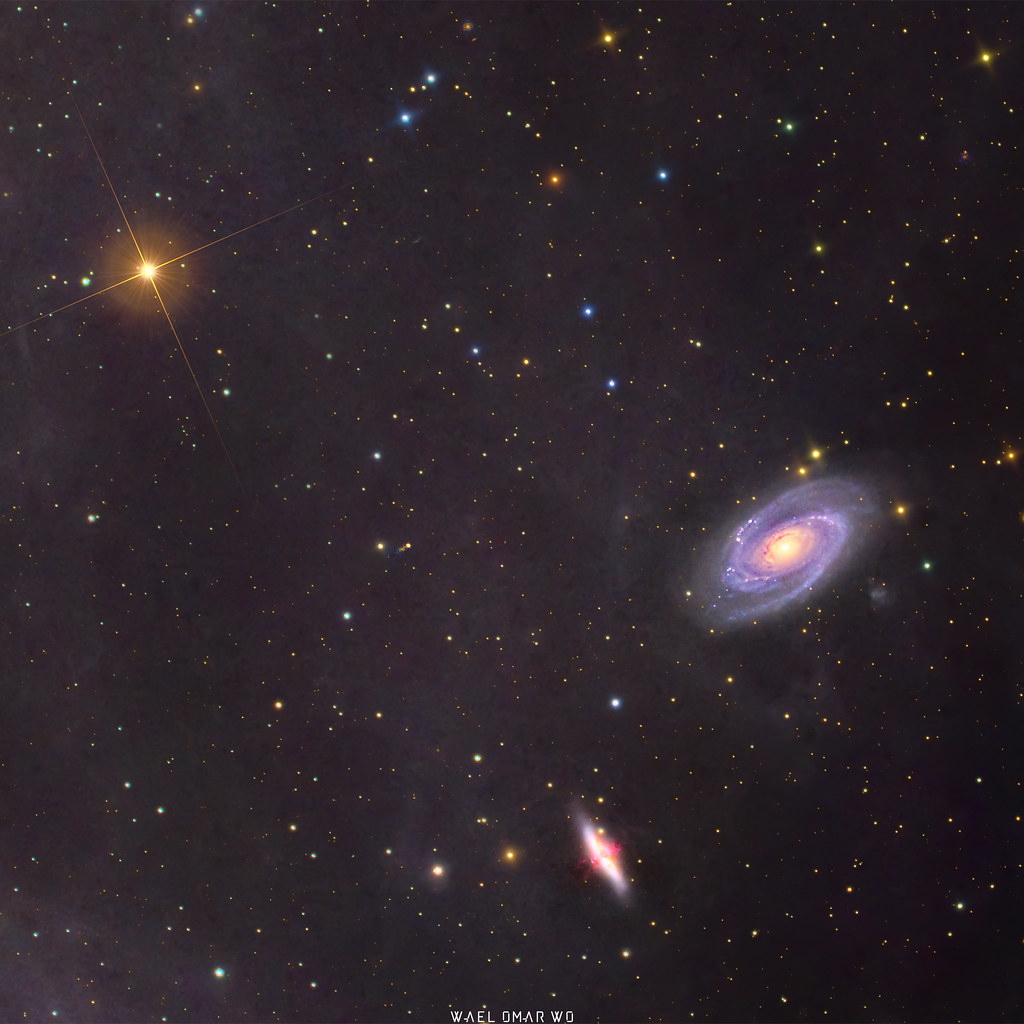
https://live.staticflickr.com/65535/521 ... bf7c_o.jpg
Bode's-Cigar Galaxies by Wael Omar, on Flickr
Image Credit: Wael Omar WO/ https://www.instagram.com/waelomar_astrophotography/
https://www.astrobin.com/users/WaelOmarWO/
Location: Qatamyah & Fayoum / EGYPT.
Re: Submissions: 2022 June
M20 - Trifid Nebula
Click on above to enlarge.
More info @ https://www.kinchastro.com/m20---trifid-nebula.html
Click on above to enlarge.
More info @ https://www.kinchastro.com/m20---trifid-nebula.html
-
tommasostella
- Ensign
- Posts: 58
- Joined: Mon Nov 11, 2019 4:34 pm
Re: Submissions: 2022 June
NGC 4631 Whale Galaxy
https://www.facebook.com/tommaso.m.stella
Copyright: Tommaso Stella
Location: Taranto (Italy)
NGC 4631 (or Whale) is a spiral galaxy identifiable in the constellation of Canes Venatici and 30 million light years away from us. The characteristics of the bulge, positioned in a slightly off-center point (the yellowest area in the photograph), suggest a very intense and turbulent star formation area. A little further up we can observe the dwarf elliptical galaxy NGC 4627 which is also part of the NGC 4631 Group. For the realization of this photo I used a monochromatic camera in order to acquire the luminance (shape and details) and a color camera for chrominance.
Location: Taranto (Italy) Sky Bortle 6
Lights: 59x180s L-Bin1 + 32x180s RGB-Bin1
Total exposure: 4.55 h
Telescope: SkyWatcher 200/1000 PDS + GPU Coma Corrector
Guide: Takahashi FS60CB + PlayerOne Neptune C II + Astronomik Planet Pro 807nm
Camera: QHY 294 Pro Mono + Omegon veTEC 571C
Filters: Optolong LCCD + Optolong L-Pro
Mount: Skywatcher AZ-EQ6 GT
Processing: DeepSkyStacker, PixInsight, Photoshop CC
https://www.facebook.com/tommaso.m.stella
Copyright: Tommaso Stella
Location: Taranto (Italy)
NGC 4631 (or Whale) is a spiral galaxy identifiable in the constellation of Canes Venatici and 30 million light years away from us. The characteristics of the bulge, positioned in a slightly off-center point (the yellowest area in the photograph), suggest a very intense and turbulent star formation area. A little further up we can observe the dwarf elliptical galaxy NGC 4627 which is also part of the NGC 4631 Group. For the realization of this photo I used a monochromatic camera in order to acquire the luminance (shape and details) and a color camera for chrominance.
Location: Taranto (Italy) Sky Bortle 6
Lights: 59x180s L-Bin1 + 32x180s RGB-Bin1
Total exposure: 4.55 h
Telescope: SkyWatcher 200/1000 PDS + GPU Coma Corrector
Guide: Takahashi FS60CB + PlayerOne Neptune C II + Astronomik Planet Pro 807nm
Camera: QHY 294 Pro Mono + Omegon veTEC 571C
Filters: Optolong LCCD + Optolong L-Pro
Mount: Skywatcher AZ-EQ6 GT
Processing: DeepSkyStacker, PixInsight, Photoshop CC
-
blastrophoto
- Ensign
- Posts: 11
- Joined: Sun Nov 14, 2021 9:54 pm
Re: Submissions: 2022 June
The Sunflower Galaxy - Messier Object 63
Link to full resolution image.
https://flic.kr/p/2nqJn6G
M63, also known as the Sunflower galaxy, is a spiral galaxy in the northern constellation of Canes Venatici with approximately 400 billion stars. M63 was first discovered by the French astronomer Pierre Méchain, then later verified by his colleague Charles Messier on June 14, 1779. There is a general lack of large-scale continuous spiral structure in visible light, so it is considered a flocculent galaxy. Although it only has two arms, many appear to be winding around its yellow core in this image captured from International Dark Site, Cherry Springs State Park. The arms shine with the radiation from recently formed blue stars and can be more clearly seen in infrared observations. By imaging flocculent spiral galaxies like M63, astronomers hope to gain a better understanding of how stars form in such systems.
This image was not part of my original imaging plan but circumstances required a redirect after some clouds interrupted southern imaging. However, though it was not part of the plan, I’m glad I decided to image this deep sky object. It’s been a couple years since I last imaged this beautiful galaxy and I shocked to find that after only 4 hours of total integration time, an incredible amount of IFN was revealed.
Gear:
Explore Scientific ED127 FCD100
ZWO ASI2600mm
Optolong LRGB 2” filter set
Skywatcher EQ6-R Pro
ZWO OAG-L
ZWO 2x5 EFW
ASI120mm guide camera
Integration Time: Data acquired on June 2, 2022 and June 3, 2022
L - 77x120s
R - 18x120s
G - 17x120s
B - 17x120s
Total: 4hrs 18min
Location: Cherry Springs State Park, Pennsylvania
Photographed and Processed by Brandon M. Lewis (blastrophoto)
Link to full resolution image.
https://flic.kr/p/2nqJn6G
M63, also known as the Sunflower galaxy, is a spiral galaxy in the northern constellation of Canes Venatici with approximately 400 billion stars. M63 was first discovered by the French astronomer Pierre Méchain, then later verified by his colleague Charles Messier on June 14, 1779. There is a general lack of large-scale continuous spiral structure in visible light, so it is considered a flocculent galaxy. Although it only has two arms, many appear to be winding around its yellow core in this image captured from International Dark Site, Cherry Springs State Park. The arms shine with the radiation from recently formed blue stars and can be more clearly seen in infrared observations. By imaging flocculent spiral galaxies like M63, astronomers hope to gain a better understanding of how stars form in such systems.
This image was not part of my original imaging plan but circumstances required a redirect after some clouds interrupted southern imaging. However, though it was not part of the plan, I’m glad I decided to image this deep sky object. It’s been a couple years since I last imaged this beautiful galaxy and I shocked to find that after only 4 hours of total integration time, an incredible amount of IFN was revealed.
Gear:
Explore Scientific ED127 FCD100
ZWO ASI2600mm
Optolong LRGB 2” filter set
Skywatcher EQ6-R Pro
ZWO OAG-L
ZWO 2x5 EFW
ASI120mm guide camera
Integration Time: Data acquired on June 2, 2022 and June 3, 2022
L - 77x120s
R - 18x120s
G - 17x120s
B - 17x120s
Total: 4hrs 18min
Location: Cherry Springs State Park, Pennsylvania
Photographed and Processed by Brandon M. Lewis (blastrophoto)
-
Jean-Baptiste Auroux
- Ensign
- Posts: 76
- Joined: Tue Nov 14, 2017 10:06 pm
Re: Submissions: 2022 June
NGC 3718 (Arp214) & NGC 3729 - Interacting galaxies
Full version : https://cdn.astrobin.com/thumbs/7ad-_qI ... 2EQU70.jpg
NGC 3718 is a barred spiral galaxy located in the Big Dipper constellation about 45 million light years from the Milky Way.
Active (Seyfert 1 type) and a LINER galaxy, NGC 3718 is also referenced in Arp's atlas of peculiar galaxies, in the class of galaxies with either irregular structures (irregularities), noticeable dust lines (absorption), or a granular appearance (resolution). NGC 3718 is in gravitational interaction with the nearby NGC 3729.
Takahashi TSA-102 f/6 - AZEQ6 - CCD AtikOne 6.0
Filters: Astronomik LRGB+Ha (6nm)
L : 108 x 600s bin1
R : 34 x 300s bin2
G : 24 x 300s bin2
B : 24 x 300s bin2
Ha : 24 x 300s bin2
Total : 26h50
Processing: Pixinsight & Photoshop
8, 13, 14 & 15 avril 2021
Fouras (France)
Copyright: Jean-Baptiste Auroux
https://millenniumphoton.com/
https://www.astrobin.com/users/Jean-Baptiste_Paris/
Full version : https://cdn.astrobin.com/thumbs/7ad-_qI ... 2EQU70.jpg
NGC 3718 is a barred spiral galaxy located in the Big Dipper constellation about 45 million light years from the Milky Way.
Active (Seyfert 1 type) and a LINER galaxy, NGC 3718 is also referenced in Arp's atlas of peculiar galaxies, in the class of galaxies with either irregular structures (irregularities), noticeable dust lines (absorption), or a granular appearance (resolution). NGC 3718 is in gravitational interaction with the nearby NGC 3729.
Takahashi TSA-102 f/6 - AZEQ6 - CCD AtikOne 6.0
Filters: Astronomik LRGB+Ha (6nm)
L : 108 x 600s bin1
R : 34 x 300s bin2
G : 24 x 300s bin2
B : 24 x 300s bin2
Ha : 24 x 300s bin2
Total : 26h50
Processing: Pixinsight & Photoshop
8, 13, 14 & 15 avril 2021
Fouras (France)
Copyright: Jean-Baptiste Auroux
https://millenniumphoton.com/
https://www.astrobin.com/users/Jean-Baptiste_Paris/





